高中英语阅读理解推理题及词义猜测题
【英语】高考英语阅读理解试题(有答案和解析)及解析

【英语】高考英语阅读理解试题(有答案和解析)及解析一、高中英语阅读理解1.阅读理解Plastic sludge(污泥)and garbage is a disaster for the world's oceans. A film crew traveled the globe to document the rubbish. And Julie Andersen of the Plastic Oceans Foundation says what we see is just the ti p of the problem. “Half of the waste actually sinks to the bottom, and that remains on the surface actually breaks down. ”The filmmakers found rubbish in ocean gyres, the circulating currents that trap large concentrations of pollution in the Atlantic, Indian, and Pacifc Oceans, home of what some have plastic. What we found was a plastic smog that spread throughout all the water. And in some parts of the oceans, scientists have found more plastic than plant. ”The pieces of the plastic garbage infect the food chain, sometimes visibly, and more so at the microscopic level, where the plastic particles interact with other pollutants. “There are heavy metals, medicines, industrial waste in the sea, while it acts like magnets(磁铁). These poisonous substances absorb on the plastic, and then when seafood absorbs the plastics, those poisonous substances enter the fatty tissues. ”To be consumed by other sea life and by people at last. China, Indonesia, the Philippines, Thailand and Vietnam are the worst plastic polluters. The United States, although a leader in recycling, is one of the world's 20 since it produces and consumes so much plastic. There are efforts around the world to address the problem, including at this newly opened recycling center in Lebanon(黎巴嫩). But Andersen says there is more that people can do. “Cut back on single-use plastics, straws, plastic cups, plastic water bottles, plastic bags and find alternatives like reusable materials.” She says healthy oceans are essential to our survival.(1)What can we learn from the passage?A. There's all island full of plastic rubbish in the Pacific.B. The bad effect of plastic pollution can't be seen by eyes.C. The United States is the least plastic polluters.D. The plastic pollution to oceans is more serious than what we can see.(2)What does the underlined word “it” refer to in paragraph 3?A. Pollutants like heavy metals and medicines.B. The plastic particles.C. Seafood.D. Fatty tissues.(3)What can be inferred from the last paragraph?A. All Asian countries have the most serious problem of plastic pollution.B. The plastic problem hasn't attracted the world's attention.C. Andersen is not satisfied with what has been done to solve the plastic problem,D. People should stop using plastic products immediately.(4)Which may be the title of the passage?A. Plastic pollution in the World.B. Plastic pollution—Oceans'Disaster.C. Ways to solve the problem of plastic pollution to oceans.D. Plastic pollution and our health.【答案】(1)D(2)B(3)C(4)B【解析】【分析】这是一篇说明文。
高考英语阅读之猜测词义

混乱
天生的
◎In the past the world seemed to run in an orderly way. Now, however, everything seems to be in a state of turmoil .
◎Some human actions are learned, but quite a few other actions are innate .
抓主旨 明细节 猜词义 做推断
猜测词义 读懂文章
---------高三英语阅读指导(阅读篇)
对考纲外生词的猜测
Many United Nations employees are polyglots: Mr. Jim, for example, speaks five languages fluently. “polyglot” most probabmlyeans “_______________.”
语
境
法
1. 定义描述
猜
测
词
义
小
结
定义或释义关系常由定语从句或is, be called ,be known as, be defined as 等词汇或破折号来表示 ; 或由that is (to say), in other words , to put it another way 引出 一些具体的解释性的短语解释生词
Ex.2
替代
丰满的
The new tax law supersedes , or replaces, the law that was in effect last year.
Mother was tall, fat and middle-aged. My aunt was an old woman, almost as plump as mother, and much shorter.
阅读理解专题——推理判断题(词义猜测+推断隐含意思)+课件-2023届高三英语二轮复习
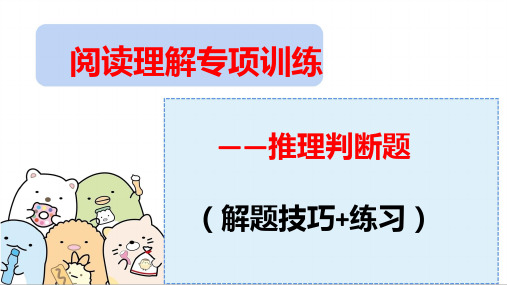
推断隐含意思
推断隐 含意思
要求 推断言外之意或弦外之音 常含infer(推断), suggest, imply
题干 常有can, could, probably, likely等
练习:名师指津P108 (四)
My mom's annual visits to my school sparked (激发) interest from other parents as well. Over the years, we had visits from parents who shared how festivals were celebrated in Germany and Italy.
than, on the contrary, on the other hand等
考点4:作出判断和推理
这类试题要求考生根据文章提供的事实和线索进行 逻辑推理,推测作者未明确提到的事实或某事件发展的 趋势。这种判断和推理的能力是阅读理解能力的重要组 成部分,因而也是阅读理解部分重点考查的能力之一。 每年每套题通常会有 4~6 题。
练习:名师指津P108 (四) Every September, I hated presenting the note my parents had expertly made to a teacher I was just getting to know. The note explained that I would be absent during the Jewish High Holidays of Rosh Hashanah and Yom Kippur. I fretted that my teachers would label me the “Jewish kid”.
高中英语真题-词义猜测题 建议用时:15分钟
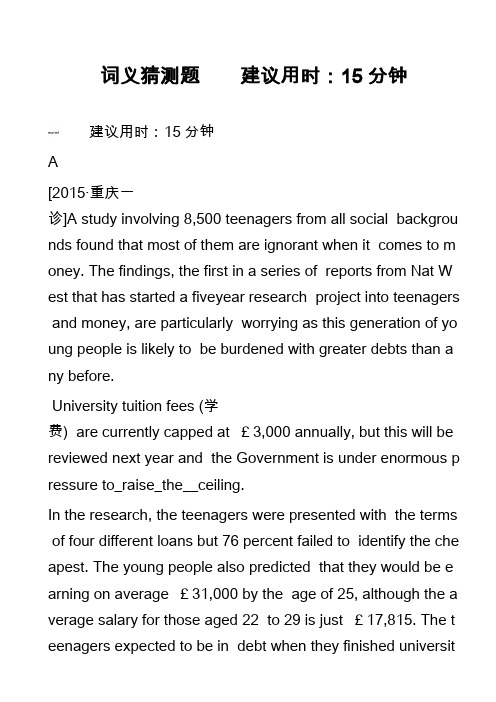
词义猜测题建议用时:15分钟建议用时:15分钟A[2015·重庆一诊]A study involving 8,500 teenagers from all social backgrou nds found that most of them are ignorant when it comes to m oney. The findings, the first in a series of reports from Nat W est that has started a fiveyear research project into teenagers and money, are particularly worrying as this generation of yo ung people is likely to be burdened with greater debts than a ny before.University tuition fees (学费) are currently capped at £3,000 annually, but this will be reviewed next year and the Government is under enormous p ressure to_raise_the__ceiling.In the research, the teenagers were presented with the terms of four different loans but 76 percent failed to identify the che apest. The young people also predicted that they would be e arning on average £31,000 by the age of 25, although the a verage salary for those aged 22 to 29 is just £17,815. The t eenagers expected to be in debt when they finished university or training, although half said that they assumed the debts would be less than £ 10,000. Average debts for graduates a re £12,363.Stephen Moir, head of community investment at the Royal Ba nk of Scotland Group which owns Nat West, said. “The more exposed young people are to financial issues, and the young er they become aware of them, the more likely they are to bec ome responsible, forwardplanning adults who manage their finances confidently and effectively.”Ministers are deeply concerned about the financial pressures on teenagers and young people because of students' loans and rising housing costs. They have just introduced new less ons in how to manage debts. Nikki Fairweather, aged 15, fro m St Helens, said that she had benefited from lessons on per sonal finance, but admitted that she still had a lot to learn abo ut money.本文是关于英国的研究机构的一份调查,表明大部分青少年对钱的问题认识不深,他们大多数过高估计了未来赚钱的前景,对他们以后可能要负担的债务也没有认识。
英语阅读理解6大题型,20个解题技巧,得高分就这么简单!

英语阅读理解6大题型,20个解题技巧,得高分就这么简单!在高考英语的复习备考中,阅读理解一直是很多同学迈不过去的坎儿,最终往往成为失分较多的题型。
如何做好阅读理解,做对阅读题?本期内容将从阅读理解常考的6个题型入手,帮助同学们分析题型、快速掌握做题技巧,真正做到有的放矢,提高做题正确率!阅读理解的设题类型主要分为基础题和深层理解题两类,其中主要包括细节理解题、推理判断题、词义猜测题、主旨大意题、写作意图题以及观点态度题这6个题型。
类别1:基础题——细节理解题1.细节理解题细节理解题主要考查原文中的具体信息,用who,when,where,what,which,why,how many和how much等进行发问,考查考生对阅读材料中的某一特定细节的理解能力。
解题原则:忠实于原文原句及全篇逻辑关系,不能主观臆断。
解题方法:Step1:题干中选定关键词(定位词)Step2:通过略读、查读锁定文中定位区域Step3:结合信息区域上下文理解、比对Step4:排除干扰项,筛选得出答案技巧1:若针对举例子、人物言论出题,需要查找例子以及人物所说的句子前后的内容,然后与各选项逐一核对。
技巧2:在出现一些关键词,如however,but,moreover, therefore,thus时,要特别注意句子前后意义的转折、递进、因果等关系。
技巧3:细节理解题的答案一般是同义替换项或者同义转换。
技巧4:选项中有绝对语气词的一般不是答案。
如: must,never, the most, all, merely, only, have to, any, no,completely,none, 等。
但不是绝对,也有例外。
技巧5:注意选项中的副词、形容词和介词短语等与原文是否一致。
如:must, may, often,should, usually,might, most,more or less,likely,all, never, few等存在程度不同,经常被偷换,往往被忽视。
阅读理解中猜测词义题的解题策略分析

二、常见阅读猜词题的设问方式:
(1). What does the underlined word “them/it” refer to? (2). In the... paragraph, the word... means (refers to). (3). According to the passage, ... probably means (4). The author uses the word... to mean. (5). The underlined phrase “punch line” most probably means______. (6). The underlined word “one” could best be replaced by ______. (7). What does “garden” in the last two paragraphs stand for? (8). Which of the following is closest in meaning to the phrase/word/sentence “___”?
1. Definition or explanation 定义法或释义法
(2). (2014新课标全国卷 I.B) Sadly, the abundance of passenger pigeons may have been their undoing. Where the birds were most abundant, people believed there was an everlasting supply and killed them by the thousands. Q: The unlined Word “undoing” probably refers to the pigeons’ ________.
英语阅读做题技巧--猜测词义
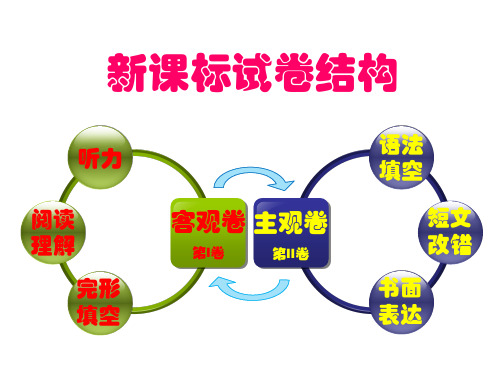
Phobias, such as fear of height, fear of water, or fear of crowds, can be eliminated through conditioning.
like such as for instance for example
恐怖症 恐惧症
3、通过因果关系(By causation)
as
Since you are my superior(上级),
so
it would be presumptuous of me to
for
tell you what to do .
thus
(2015年上海卷) 冒失的,冒昧的
since
A.full of respect
7. 根据构词方法(By word formation)
常用句式
1. The word ______in this paragraph probably means...
2. What does the author
mean by _in this paragraph ?
3. What does the underlined word _____mean?
7、根据构词方法(By word formation)
We have just had an unforgettable holiday together and are now in USA the whole family. 难以忘怀的
un- forget -able
prefix base word
1、根据定义解释(By definition)
mean that is that’s to say
专题 13 词义猜测题之代词指代-2021年高考英语阅读理解精讲精练 (解析版)
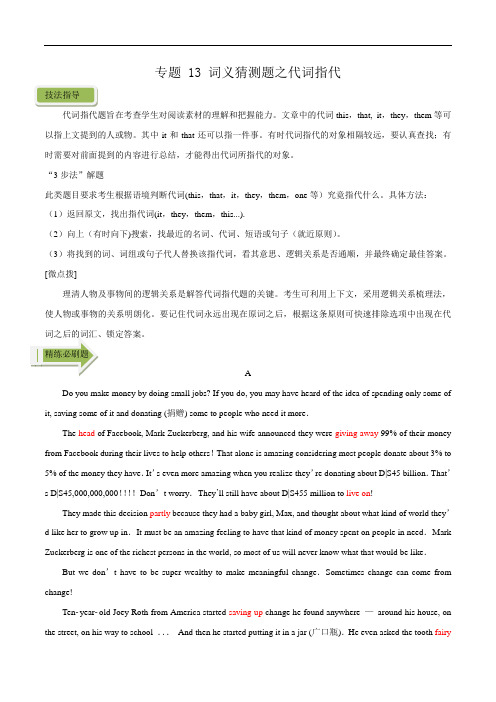
专题 13 词义猜测题之代词指代代词指代题旨在考查学生对阅读素材的理解和把握能力。
文章中的代词this,that, it,they,them等可以指上文提到的人或物。
其中it和that还可以指一件事。
有时代词指代的对象相隔较远,要认真查找;有时需要对前面提到的内容进行总结,才能得出代词所指代的对象。
“3步法”解题此类题目要求考生根据语境判断代词(this,that,it,they,them,one等)究竟指代什么。
具体方法:(1)返回原文,找出指代词(it,they,them,this...).(2)向上(有时向下)搜索,找最近的名词、代词、短语或句子(就近原则)。
(3)将找到的词、词组或句子代人替换该指代词,看其意思、逻辑关系是否通顺,并最终确定最佳答案。
[微点拨]理清人物及事物间的逻辑关系是解答代词指代题的关键。
考生可利用上下文,采用逻辑关系梳理法,使人物或事物的关系明朗化。
要记住代词永远出现在原词之后,根据这条原则可快速排除选项中出现在代ADo you make money by doing small jobs? If you do, you may have heard of the idea of spending only some of it, saving some of it and donating (捐赠) some to people who need it more.The head of Facebook, Mark Zuckerberg, and his wife announced they were giving away 99% of their money from Facebook during their lives to help others!That alone is amazing considering most people donate about 3% to 5% of the money they have.It’s even more amazing when you realize they’re donating about D|S45 billion.That’s D|S45,000,000,000!!!!Don’t worry.They’ll still have about D|S455 million to live on!They made this decision partly because they had a baby girl, Max, and thought about what kind of world they’d like her to grow up in.It must be an amazing feeling to have that kind of money spent on people in need.Mark Zuckerberg is one of the richest persons in the world, so most of us will never know what that would be like.But we don’t have to be super wealthy to make meaningful change.Sometimes change can come from change!Tenyearold Joey Roth from America started saving up change he found anywhere —around his house, on the street, on his way to school ...And then he started putting it in a jar (广口瓶).He even asked the tooth fairyto donate some change in his letter to her after he lost a tooth! (The tooth fairy is an imaginary person.) His collection, Jar for Change, has grown into a communitywide effort and he has raised over D|S10,000 all from people dropping coins into jars! The money he raises goes to help connect parents with their very sick babies.See what these people have done? You, too, can make a difference— no matter how old you are, where you live and how much you earn!1.How much would most people donate if they had 10,000 yuan?A.30-50 yuan.B.50-100 yuan.C.300-500 yuan. D.500-1,000 yuan.2.Mark Zuckerberg and his wife decided to make such a donation partly because of ________.A.Joey Roth B.their daughterC.their education D.their childhood3.What does the underlined word “that”in the third paragraph refer to?A.Making money.B.Spending money unwisely.C.Being the richest person in the world.D.Giving away D|S45 billion to help others.4.What does the author intend to tell us by mentioning Joey Roth’s story?A.Everyone can help others.B.Giving makes people happy.C.Pocket money can be helpful.D.Giving is better than receiving.BThere is more of a connection between food and culture than you may think. On an individual level, we grow up eating the food of our culture. It becomes a part of who we are. Many of us associate food from our childhood with warm feelings and good memories and it ties us to our families, holding a special and personal value for us. Food from our family often becomes the comfort food we seek as adults in times of frustration and stress.On a large scale, traditional food is an important part of culture. It also operates as an expression of culture identity. Immigrants bring it wherever they go, and it is a symbol of pride for their culture and means of coping with homesickness.Many immigrants open their own restaurants and serve traditional dishes. However, the food does not remain exactly the same. Some materials needed to make traditional dishes may not be readily available, so the taste and flavor can be different from what they would prepare in their home countries. Additionally, immigrants do not only sell dishes to people from the same countries as them, but to people from different countries. Therefore, they have to make small changes about the original dishes to cater to a wider range of customers. Those changes can create new flavors that still keep the cultural significance of the dishes.We should not only embrace our heritage (遗产) through our culture’s food but also become more informed about other cultures by trying their food. It is important to remember that each dish has a special place in the culture to which it belongs, and is special to those who prepare it. Food is a window into culture, and it should be treated as such.5.What’s the function of food mentioned in the article?A.To help motivate homesickness.B.To show national identity.C.To reflect a country’s history.D.To show a community’s superiority.6.What does the underlined word “it” in Paragraph 2 refer to?A.The specific traditional food.B.The national culture.C.A traditional expression of food.D.The old-fashioned taste.7.Why do some immigrants have to change the original dishes in their restaurants?A.To attach cultural importance to their dishes.B.To announce the beginning of their life on foreign soil.C.To make the dishes popular among customers.D.To present their own food culture in a new way.8.What’s he author’s attitude toward different food cultures?A.Negative.B.Balanced.C.Unfair. D.Unchangeable.CAlong with the progress of reform and opening up, the Chinese film industry has also made remarkable achievements and become in a flourishing (繁荣的) state in economic growth. It has recorded social changes in the past decades through the medium of the film. The film market of China has been much better than that of North America, becoming the largest in the world during the first season of 2019.In the original stage of reform and opening up, old Chinese movies were rescreen ed and foreign movies dubbed (译制). Audiences' enthusiasm for movies was lighted up by both these practices. In 1979, the attendance ofChinese moviegoers reached a record high of 29.3 billion. However, televisions and other entertainment activities sprang up in the late 1980s and drew many audiences away from movies when the film market faced a danger.The employment of a socialist market economy in China in 1992 brought energy again to the film industry. With the introduction of free competition and reforms, it made an abundant recovery and experienced rapid growth. In the same period, China began to introduce overseas movies into the home market, especially those from Hollywood. Despite the argument that foreign movies occupy the space of home-made ones, Chinese movies with increasingly higher quality have gained a firm foothold in the local market with box offices setting several new records.The development of the Internet has added new energy to the Chinese film industry. In 2015, the powerful Internet companies, one called Tencent and another Alibaba, developed their own film arm and began to adapt popular online stories for movies. With big data, more accurate marketing skills can target specific audiences to satisfy their personal preferences. Yet the development of online cinemas may pose threats to the survival of offline ones. Now the film industry is exploring more advanced film screening technologies to provide audiences with an improved movie experience.9.Which threat did the Chinese film market face in the late 1980s?A.Popularity of televisions.B.Development of online cinemas.C.A slowdown in economic growth.D.Introduction of overseas movies.10.What does the underlined word “it” in Paragraph 3 refer to?A.The space of Chinese movies.B.The Chinese film industry.C.The socialist market economy.D.The introduction of reform and opening up.11.What does the author indicate in the end?A.Online cinemas will replace traditional ones sooner.B.The film screening technology is key to films' success.C.The Internet is a two-edged sword for the film industry.D.Movies made by Tencent and Alibaba are most successful.12.What would be the best title for the text?A.The Ever-changing Film MarketB.Popular Online FilmsC.Advanced Film TechnologiesD.Flourishing Chinese Films答案A语篇解读:不是一定要有很多钱才能帮助别人,我们也可以从小处做起。
超实用高考英语复习:阅读理解微技能之词义猜测(原题版)
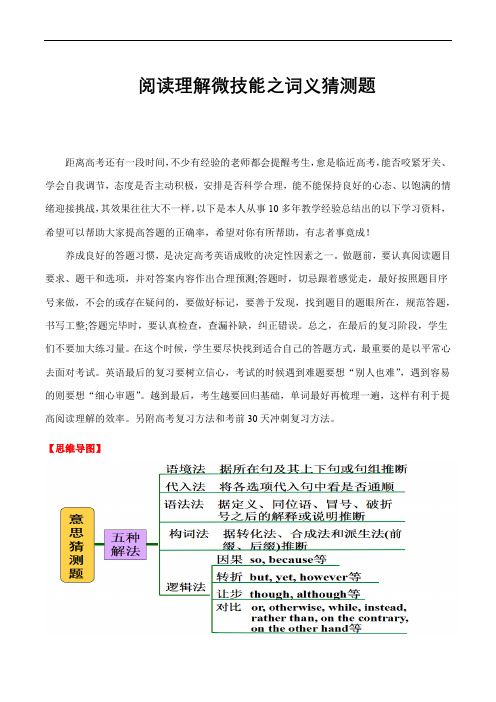
阅读理解微技能之词义猜测题距离高考还有一段时间,不少有经验的老师都会提醒考生,愈是临近高考,能否咬紧牙关、学会自我调节,态度是否主动积极,安排是否科学合理,能不能保持良好的心态、以饱满的情绪迎接挑战,其效果往往大不一样。
以下是本人从事10多年教学经验总结出的以下学习资料,希望可以帮助大家提高答题的正确率,希望对你有所帮助,有志者事竟成!养成良好的答题习惯,是决定高考英语成败的决定性因素之一。
做题前,要认真阅读题目要求、题干和选项,并对答案内容作出合理预测;答题时,切忌跟着感觉走,最好按照题目序号来做,不会的或存在疑问的,要做好标记,要善于发现,找到题目的题眼所在,规范答题,书写工整;答题完毕时,要认真检查,查漏补缺,纠正错误。
总之,在最后的复习阶段,学生们不要加大练习量。
在这个时候,学生要尽快找到适合自己的答题方式,最重要的是以平常心去面对考试。
英语最后的复习要树立信心,考试的时候遇到难题要想“别人也难”,遇到容易的则要想“细心审题”。
越到最后,考生越要回归基础,单词最好再梳理一遍,这样有利于提高阅读理解的效率。
另附高考复习方法和考前30天冲刺复习方法。
【思维导图】【词义猜测题微技能】1.单词或短语意义猜测词汇量小是制约学生阅读理解能力的一个重要因素。
具体技巧如下:(1)根据定义或上下文解释进行猜测。
有时短文中出现一个需要猜测其意义的词或短语,下面接着出现其定义或解释,这就是判断该词或短语意义的主要依据。
(2)根据同位关系进行猜测。
阅读中出现的难词有时后面紧跟一个同位语,对前面的词进行解释,这时可利用同位关系对前面或后面的词义或短语意义进行猜测。
(3)根据同义关系进行猜测。
当词或短语之间有并列连词and 或or时,其连接的两项内容在含义上是接近的或递进的或相反的,由此确定同等关系中的某个生词所属的义域,进而可推知其大致意思。
(4)根据构词法(合成、派生、转化等)进行猜测。
在英语中,有很多词可以在前面加前缀或在后面加后缀,从而构成另外一个词,乍看起来,这个词可能是新词,但掌握一定的构词知识,就不难猜出它的词义了。
高一英语阅读理解试题(有答案和解析)及解析
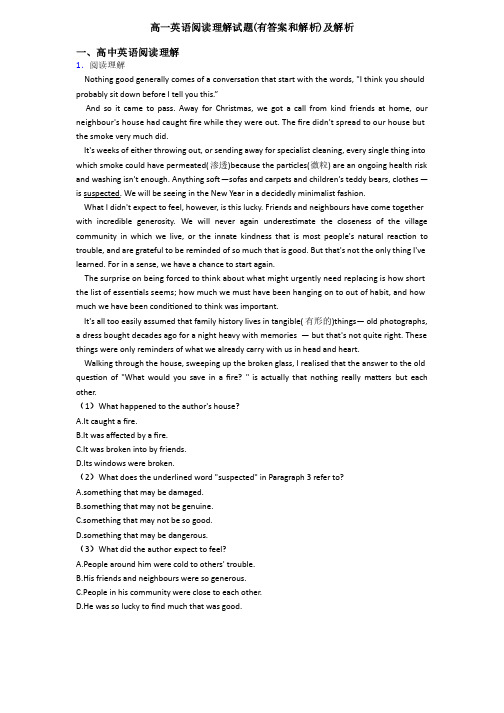
高一英语阅读理解试题(有答案和解析)及解析
一、高中英语阅读理解
1.阅读理解 Nothing good generally comes words, "I think you should
probably sit down before I tell you this.” And so it came to pass. Away for Christmas, we got a call from kind friends at home, our
Walking through the house, sweeping up the broken glass, I realised that the answer to the old ques on of "What would you save in a fire? " is actually that nothing really ma ers but each other. (1)What happened to the author's house? A.It caught a fire. B.It was affected by a fire. C.It was broken into by friends. D.Its windows were broken. (2)What does the underlined word "suspected" in Paragraph 3 refer to? A.something that may be damaged. B.something that may not be genuine. C.something that may not be so good. D.something that may be dangerous. (3)What did the author expect to feel? A.People around him were cold to others' trouble. B.His friends and neighbours were so generous. C.People in his community were close to each other. D.He was so lucky to find much that was good.
阅读理解-判断推理题
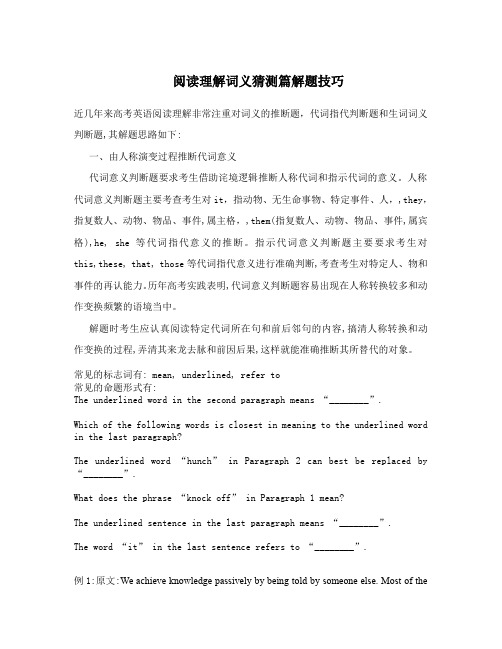
阅读理解词义猜测篇解题技巧近几年来高考英语阅读理解非常注重对词义的推断题,代词指代判断题和生词词义判断题,其解题思路如下:一、由人称演变过程推断代词意义代词意义判断题要求考生借助诧境逻辑推断人称代词和指示代词的意义。
人称代词意义判断题主要考查考生对it,指动物、无生命事物、特定事件、人,,they,指复数人、动物、物品、事件,属主格,,them(指复数人、动物、物品、事件,属宾格),he, she等代词指代意义的推断。
指示代词意义判断题主要要求考生对this,these, that, those等代词指代意义进行准确判断,考查考生对特定人、物和事件的再认能力。
历年高考实践表明,代词意义判断题容易出现在人称转换较多和动作变换频繁的语境当中。
解题时考生应认真阅读特定代词所在句和前后邻句的内容,搞清人称转换和动作变换的过程,弄清其来龙去脉和前因后果,这样就能准确推断其所替代的对象。
常见的标志词有: mean, underlined, refer to常见的命题形式有:The underlined word in the second paragraph means “________”.Which of the following words is closest in meaning to the underlined word in the last paragraph?The underlined word “hunch” in Paragraph 2 can best be replaced by “________”.What does the phrase “knock off” in Paragraph 1 mean?The underlined sent ence in the last paragraph means “________”.The word “it” in the last sentence refers to “________”.例1:原文:We achieve knowledge passively by being told by someone else. Most of thelearning that takes place in the classroom and the kind that happens when we watch TV or read newspapers or magazines is passive. Conditioned as we are to passive learning, it’s not surprising that we depend on it in our everyday communication with friends and co-workers. (天津卷D卷)试题:The underlined word “it” in paragraph 2 r efers to ______(49题)A active learningB knowledgeC communicationD passive learning例2:原文:Photographs are everywhere. They decorate the walls of homes and are used in stores for sales of different goods. The news is filled with pictures of fires, floods, and special events. Photos record the beauties of nature. They can also bring things close that are far away. Through photos, people can see wild animals, cities in foreign lands, and even the stars in outer space. Photo also tell stories. (陕西卷B篇)试题:The underlined word “they” in the first paragraph refers to_____(45题)A beautiesB photosC goodsD events例3:原文:Tanni’s enduring success has been part motivation, part preparation. “The training I do that enables me to be a good sprinter(短跑运动员)enables me to be a good at a marathon too. I train 50 weeks of the year and that keeps me prepared for whatever distance I went to race------I am still competing at a very high level, but as I get older things get harder and I went to re tire before I fall apart.”(福建卷A篇)试题:The underlined word “that” in the 5th paragraph refers to_______(58题)A.fifty weeks’ trainingB.being a good sprinterC.training almost every dayD.part motivation and part preparation例4:原文:The next day my dad pulled out his childhood pictures and told me quite a few stories about his own childhood . Although our times together became easier over theyears, I never felt closer to him at that moment. After so many years, I’m at last seeing another side of my fath er. And in so doing, I’m delighted with my new friend. My dad, in his new home in Arizona, is back to me from where he was.(全国卷I ,篇)试题: The underlined words “my new friend” in the last paragraph refer to________(59题)A the author’s sonB the author’s fatherC the friend of the author’s fatherD the café owner例5:原文:Some politicians often use this trick. Let’s say that during Governor Smith’s last term, her state lost one million jobs and gained three million jobs. Then she seeks anot her term. One of her opponents says,“During Governor Smith’s term, the state lost one million jobs!”that’s true. However, and honest statement would have been, “During Governor Smith’s term, the state had a net gain of two million jobs”------(全国卷:篇)试题:Wh at do the underlined words “net gain” in paragraph 5 mean?(51题)A.final increaseB.big advantagerge shareD.total saving例6:原文:A Brown University sleep researcher has some advice for people who run high schools: Don’t start classes s o early in the morning. It may not be that the students who nod off at their desks are lazy. And it may not be that their parents have failed to enforce bedtime. Instead, it may be that biologically these sleepyhead students aren’t used to the early hour.------(08浙江卷C篇)试题:The underlined phrase “nod off”(paragraph1) most probably means“______”(49)题A.turn aroundB.agree with othersC.fall asleepD.refuse to work例7: 原文:be skeptical; the topmost branches are usually too skinny to hold weight, and we could never climb high enough to see anything except other trees.------(天津卷E篇) 试题:The underlined word“skeptical”in Paragraph 3 is closest in meaning to _______ (54题)A.clamB.doubtfulC.seriousD.optimistic例8:原文:Climbing attracts people because it’s good exercise for almosteveryone. You use your whole body a complete workout. When you climb,both your mind and your body can become stronger. (安徽卷:篇)试题:The word “workout” underlined in the last paragraph most prob ably means ________(66题)A.settlementB.exerciseC.excitementD.tiredness例9:原文: Parents who found older children bullying younger brothers and sisters might do well to replace shouting and punishment by rewarding and giving more attention to the injured ones. It’s certainly much easier and more effective.(湖北卷B篇)试题:According to the passage, the underlined word “bullying” is closest in meaning to “_________”(67题)A.helpingB.punishingC.hurtingD.protecting词义猜测题强化训练◆Car rentals (出租) are becoming more and more popular as an inexpensive way of taking to the roads.1. The underlined word “inexpensive” in the sentence is closest in meaning to _____.A. modernB. valuableC. convenientD. cheap◆Mr. Smith loves to talk, and his wife is similarly loquacious.2. The underlined word “loquacious” in the sentence probably means _____.A. quietB. calmC. activeD. talkative◆The old woman has a strange habit to keep over 100 cats in her house. Her neighbors all called her an eccentric lady.3. An eccentric lady is likely _____.A. to get along with easilyB. to be different from most peopleC. to be humor and lovelyD. to be serious and beloved◆Most women in Ghana — the educated and illiterate, the urban and rural, the young and old — work to earn an income in addition to maintaining their roles as housewives and mothers.4. The underlined word “illiterate” in the passage means _____.A. repeatedB. richC. uneducatedD. sick◆Dr. Barnard was a member of an agricultural mission to India, a group of experts on better farming methods.5. The underlined word “mission” in the sentence means _____.A. a group of workers working abroadB. a group of students studying abroadC. a group of tourists travelling in foreign countriesD. a group sent abroad to offer help to a foreign country◆Before the main business of a conference begins, the chairman usually makes a short preliminary speech, or makes a few preliminary remarks. In other words, he says a few things by way of introduction.6. What do the underlined words “preliminary speech” mean?A. A speech to give a brief introduction.B. A speech to make the atmosphere active.C. A speech to attract the attention of the listeners.D. A speech to make the listeners laugh.◆Music, for instance, was once as groups’ experience. ... For many people now, however, music is an individual experience.7. The underlined word “individual” probably means _____.A. specialB. personalC. seriousD. alone1-7 DDBCDAB。
全攻略-高中英语阅读理解题型体裁解读、解题技巧及练习(附答案)

高考英语阅读理解技巧点拨—推理判断题(一)题型复习阅读理解归纳为以下四大题型,根据阅读理解题考查角度的不同,可采用不同的解题技巧来应付。
Ⅰ.事实细节题Ⅱ.猜测词义题学会”顺藤摸瓜",通过构词,语法,定义,同位,对比,因果,常识,上下文等线索确定词义。
在阅读解题时要注意从以下七个方面着手:1)根据定义或解释、说明猜测生词的词义2)根据对比关系猜测生词的词义3)通过因果关系猜测词义4)根据生活常识猜测词义5)根据同等关系猜测词义6)根据列举的事例猜测词义7)根据构词法知识猜测词义Ⅲ.推理判断题做这类题要求考生在阅读理解整体语篇的同时,又要求学生对作者的态度、意图及文章细节的发展作正确的推理判断,力求从作者的角度去考虑,不要固守自己的看法或观点。
不要主观臆断,凭空想象,任意发挥,而走入误区。
学生要学会运用主题句去推测、揣摩文字背后作者的意图,运用归纳、对比、演绎技能,运用背景知识去挖掘文章深层含义,从而正确理解作者的言外之意,同时认真体会文章的语气与感情基调(如:否定、厌恶、反问、讽刺等).这类试题常以如下句式发问:①What can you conclude/ imply from this passage?②What’s the author's attitude(态度)towards.。
?③We can infer /learn from the passage that...Ⅳ.主旨大意题这种题型要求考生能够把握文章的总体,并真正理解主题和中心;要求能较好地运用概括、判断、归纳、推理等逻辑思维方法解题,难度较大,属于高层次题.一般主旨大意题可以分为两类:1.确定文章的标题和主题(title or topic)标题位于文章之首,用来高度概括文章内容,点明文章主题。
它可以是单词,短语,也可以是句子。
要确定文章标题,首先,要在阅读原文的基础上,考虑标题是否与主题密切相关;其次,看标题是否能概括全文内容。
高考英语阅读理解词义猜测题附答案
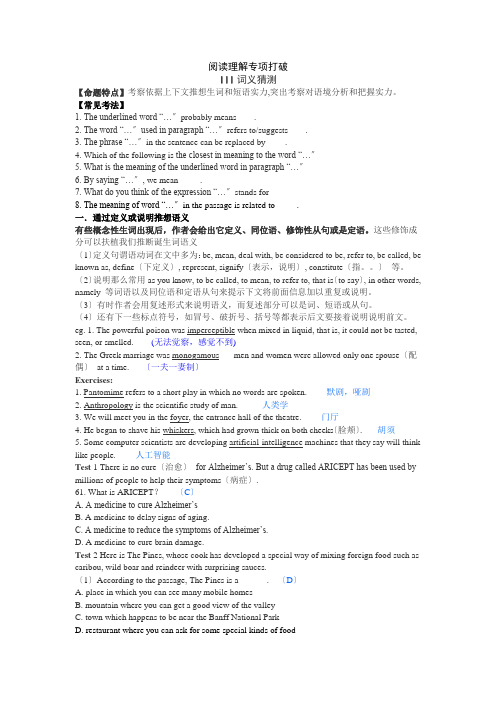
阅读理解专项打破III词义猜测【命题特点】考察依据上下文推想生词和短语实力,突出考察对语境分析和把握实力。
【常见考法】1. The underlined word “…〞probably means____.2. The word “…〞used in paragraph “…〞refers to/suggests____.3. The phrase “…〞in the sentence can be replaced by ____.4. Which of the following is the closest in meaning to the word “…〞5. What is the meaning of the underlined word in paragraph “…〞6. By saying “…〞, we mean_____.7. What do you think of the expression “…〞stands for8. The meaning of word “…〞in the passage is related to_____.一.通过定义或说明推想语义有些概念性生词出现后,作者会给出它定义、同位语、修饰性从句或是定语。
这些修饰成分可以扶植我们推断诞生词语义〔1〕定义句谓语动词在文中多为:be, mean, deal with, be considered to be, refer to, be called, be known as, define〔下定义〕, represent, signify〔表示,说明〕, constitute〔指。
〕等。
〔2〕说明那么常用as you know, to be called, to mean, to refer to, that is〔to say〕, in other words, namely 等词语以及同位语和定语从句来提示下文将前面信息加以重复或说明。
2021届高考英语词义猜测题题型分类与练习
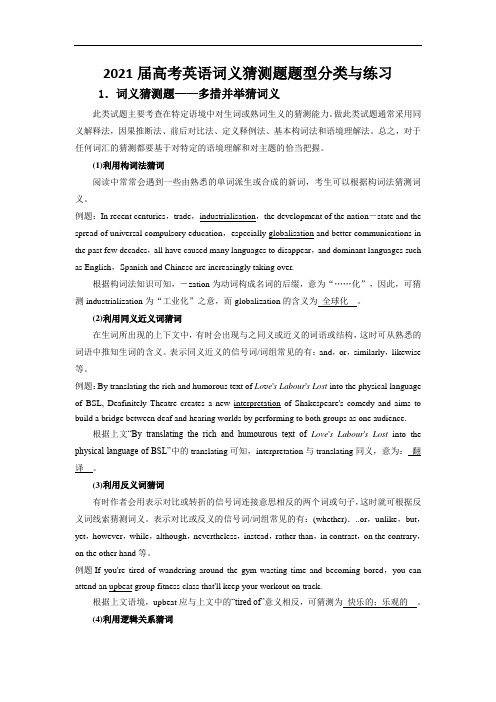
2021届高考英语词义猜测题题型分类与练习1.词义猜测题——多措并举猜词义此类试题主要考查在特定语境中对生词或熟词生义的猜测能力。
做此类试题通常采用同义解释法,因果推断法、前后对比法、定义释例法、基本构词法和语境理解法。
总之,对于任何词汇的猜测都要基于对特定的语境理解和对主题的恰当把握。
(1)利用构词法猜词阅读中常常会遇到一些由熟悉的单词派生或合成的新词,考生可以根据构词法猜测词义。
例题:In recent centuries,trade,industrialisation,the development of the nation-state and the spread of universal compulsory education,especially globalisation and better communications in the past few decades,all have caused many languages to disappear,and dominant languages such as English,Spanish and Chinese are increasingly taking over.根据构词法知识可知,-zation为动词构成名词的后缀,意为“……化”,因此,可猜测industrialization为“工业化”之意,而globalization的含义为_全球化__。
(2)利用同义近义词猜词在生词所出现的上下文中,有时会出现与之同义或近义的词语或结构,这时可从熟悉的词语中推知生词的含义。
表示同义近义的信号词/词组常见的有:and,or,similarly,likewise 等。
例题:By translating the rich and humorous text of Lo v e's Labour's Lost into the physical language of BSL, Deafinitely Theatre creates a new interpretation of Shakespeare's comedy and aims to build a bridge between deaf and hearing worlds by performing to both groups as one audience.根据上文“By translating the rich and humourous text of Love's Labour's Lost into the physical language of BSL”中的translating可知,interpretation与translating同义,意为:_翻译__。
高考英语二轮专题复习专题强化练(四)阅读理解之推理判断题(Ⅱ)

专题强化练(四)阅读理解之推理判断题(Ⅱ)A(2020·北京海淀区高三一模)Early February,I was flying up to Ohio.Well prepared,I had everything in my favour—fuel for five hours,charts in order,my flight plan on my lap,and a beautiful clear sky.I was wrong.I had heard about Alberta Clippers coming out of Canada.I knew all about them—how an entire air mass was streaming along at over sixty miles an hour.That morning,the Weather Briefer informed me that an Alberta Clipper was going over Chicago about the time I got to the airport.Chicago was some 400 miles from my destination—not a factor,or so I thought.That was the first hint I missed.The controller called and asked if I wanted to adjust my flight plan.I did the check and everything was in the green.So I told him no.Twenty minutes later the controller called again asking whether I wanted to adjust my flight plan.I checked everything.All was fine.I ignored that hint.I was fooled by the smooth air and limited experience with a rapidly moving air mass that was not changing violently.The Alberta Clipper was clipping along.The first blast of turbulence(气流) struck my plane.I got slammed into the roof,and then slammed sideways hitting the window with such force up my nose that I started bleeding.After a 2-hour flight of 100 miles,I realized fuel was now an issue.So was landing.I called Flight Following.We figured out theairport I could land.The engine stopped.So did my heart.There is no quiet as quietly stunning as this one at such an altitude.I had run out of fuel in the left tank,,,the engine quit for the last time.I was a glider now.I made a long lazy spiral descent.Down I went.I stopped at the very end of the runway.I made so many mistakes,missed so many clues,and showed my ignorance so much that I beat myself up over and over again in my mind.I learned textbook descriptions of Alberta Clippers and real-life experience with one are totally different.I will never forget the sound of that silence.I flew home the next day.Older.Wiser.Humbler.Lucky.1.We can know from the passage that Alberta Clippers ________.A.can bring snowstormsB.are quick-moving air massesC.are violently changing air pressureD.can lead to a sudden temperature drop2.What mainly led to the author's missing all the hints?A.His lack of flying experience.B.His poor preparation for the journey.C.His misjudgement about the air mass.D.His overconfidence in his piloting skills.3.Which is the right order of the events?a.I declared an emergency.b.My airplane was running out of fuel.c.I insisted on carrying on my flight plan.d.I was thrown to the roof by the violent air mass.e.I slightly banked my airplane and made a landing.A.dcbea B.dcebaC.cdabe D.cdbae4.The passage describes________.A.a rewarding training B.a narrow escapeC.a painful exploration D.a serious accident【语篇解读】本文讲述了作者遭遇“艾尔伯特风剪”时死里逃生的故事,旨在告诫读者不要盲目自信并随时保持警惕。
高考英语二轮复习阅读理解中词句猜测-词义猜测题考查解读
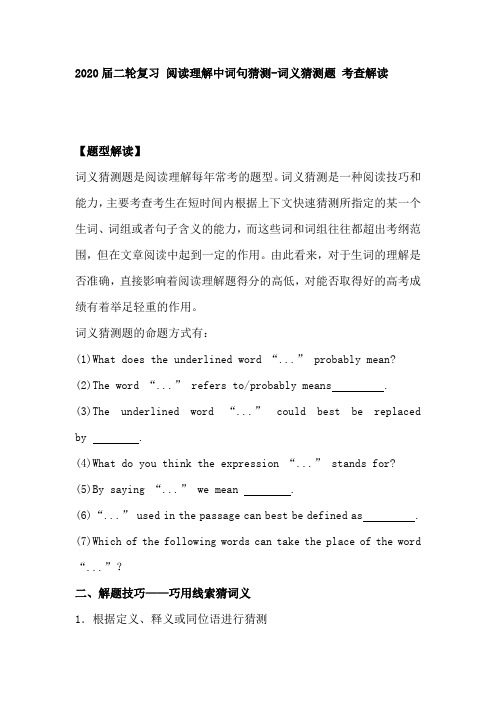
2020届二轮复习阅读理解中词句猜测-词义猜测题考查解读【题型解读】词义猜测题是阅读理解每年常考的题型。
词义猜测是一种阅读技巧和能力,主要考查考生在短时间内根据上下文快速猜测所指定的某一个生词、词组或者句子含义的能力,而这些词和词组往往都超出考纲范围,但在文章阅读中起到一定的作用。
由此看来,对于生词的理解是否准确,直接影响着阅读理解题得分的高低,对能否取得好的高考成绩有着举足轻重的作用。
词义猜测题的命题方式有:(1)What does the underlined word “...” probably mean?(2)The word “...” refers to/probably means .(3)The underlined word “...” could best be replaced by .(4)What do you think the expression “...” stands for?(5)By saying “...” we mean .(6)“...” used in the passage can best be defined as .(7)Which of the following words can take the place of the word “...”?二、解题技巧——巧用线索猜词义1.根据定义、释义或同位语进行猜测有些文章,特别是科技说明文,作者通常会对一些关键词或专业术语下定义,通过阅读定义和解释部分,考生便可理解该词或短语的意思。
有时,需要猜测的单词或短语后面会紧跟一个同位语,作为对前面的词或短语的解释说明。
有时,文章会用冒号、破折号、括号等对某个词或短语加以解释说明。
例如:Taylor’s swift action helped her teammates calm down.One girl called 911.Two more ran to get the school nurse,who brought a defibrillator,an electronic device(器械) that can shock the heart back into work.Luck stayed with them:Paris’s heartbeat returned.分析:所猜测单词defibrillator后面出现了同位语an electronic device(器械) that can shock the heart back into work (一个可以电击心脏使其重新工作的电子器械)来进行解释说明,我们可推知其词义应为“(心脏)除颤器”。
高三英语专项校公开课 阅读理解猜测词义

危险 词义:________ Skill 2: 通过举例进行猜测 常用such as, like, for example, for instance等 引出例子。
Practice2: I left university with a good degree in English Literature, but no sense of what I wanted to do. Over the next six years, I was treading water, just trying to earn an income. I tried journalism, but I didn’t think I was any good, then finance, which I hated. Finally, I got a job as a rights assistant at a famous publisher. I loved working with books, although the job that I did was dull. What does the underlined part in Paragraph 1 mean?___ C A.I was waiting for good fortune. B. I was trying to find an admirable job. C. I was being aimless about a suitable job. D. I was doing several jobs for more pay at a time.
Practice1: You should never put a cotton swab or other object into the ear canal. But you can use a swab or cloth to clean the outer part of the ear. The experts agree with the old saying that you should never put anything smaller than your elbow in your ear.
2024年新高考英语一轮复习专题 21 阅读理解之词义猜测题(含答案解析)
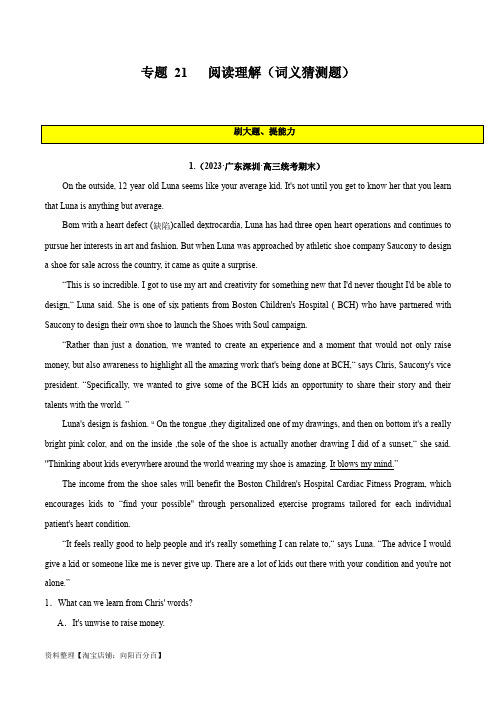
专题21 阅读理解(词义猜测题)1.(2023·广东深圳·高三统考期末)On the outside, 12-year-old Luna seems like your average kid. It's not until you get to know her that you learn that Luna is anything but average.Bom with a heart defect (缺陷)called dextrocardia, Luna has had three open-heart operations and continues to pursue her interests in art and fashion. But when Luna was approached by athletic shoe company Saucony to design a shoe for sale across the country, it came as quite a surprise.“This is so incredible. I got to use my art and creativity for something new that I'd never thought I'd be able to design,“ Luna said. She is one of six patients from Boston Children's Hospital ( BCH) who have partnered with Saucony to design their own shoe to launch the Shoes with Soul campaign.“Rather than just a donation, we wanted to create an experience and a moment that would not only raise money, but also awareness to highlight all the amazing work that's being done at BCH,“ says Chris, Saucony's vice president. “Specifically, we wanted to give some of the BCH kids an opportunity to share their story and their talents with the world. ”Luna's design is fashion. u On the tongue ,they digitalized one of my drawings, and then on bottom it's a really bright pink color, and on the inside ,the sole of the shoe is actually another drawing I did of a sunset,“ she said. "Thinking about kids everywhere around the world wearing my shoe is amazing. It blows my mind.”The income from the shoe sales will benefit the Boston Children's Hospital Cardiac Fitness Program, which encourages kids to “find your possible" through personalized exercise programs tailored for each individual patient's heart condition.“It feels really good to help people and it's really something I can relate to,“ says Luna. “The advice I would give a kid or someone like me is never give up. There are a lot of kids out there with your condition and you're not alone.”1.What can we learn from Chris' words?A.It's unwise to raise money.B.It's optional to seek donations.C.It's wonderful to study art.D.It's necessary to show kids' talents.2.What does Luna mean by “It blows my mind" in paragraph 5?A.I'm overjoyed.B.['m very serious.C.My mind goes blank.D.My mind is racing.3.Which of the following best describes Luna?A.Gifted and determined.B.Generous and serious.C.Grateful and helpful.D.Creative and sensitive.4.What is the text mainly intended to do?A.Tell us a story of a disabled girl.B.Set a good example to the disabled.C.Launch Saucony's new brand shoes.D.Introduce a campaign with kid patients.【答案】1.D 2.A 3.A 4.D【分析】这是一篇记叙文。
高中英语真题-专项限时训练二十八) [阅读理解之推理判断和猜测词义]
![高中英语真题-专项限时训练二十八) [阅读理解之推理判断和猜测词义]](https://img.taocdn.com/s3/m/a3ad7337ef06eff9aef8941ea76e58fafab0453a.png)
高中英语真题:专项限时训练(二十八) [阅读理解之推理判断和猜测词义](限时:25分钟)一、推理判断1.The earthquake may rightly be ranked as one of the mo st disastrous forces known to man: since records began to be w ritten down, it has been estimated (估计) that earthquakerelated deaths have numbered in the million s, and that earthquakerelated loss has been beyond calculation …The great majority of all earthquakes occurred in two particular areas in history…It is doubtful that man will be ever able to control earthquakes a nd get rid of their damage altogether.But as how and why earth quakes happen become better understood, man will become m ore and more able to deal with their possible damage before th ey occur.The author's purpose in writing the passage probably is to____ ____.A.inform the readerB.entertain the readerC.support a theoryD.question a theory2.Why isn't your newspaper reporting any good news? All I read about is murder, bribery and death. Frankly, I'm sick of al l the bad news.The author's attitude towards the newspaper reporting is to ___ _____.A.complain B.apologizeC.amuse D.inform3.With the past in mind, preparations the 2013 season inc luded sweeping changes on both the technical and personal sid es. The management at Toyota Motorsport GmbH was restruct ed, with John Howett moving from Toyota Motor Marketing Eur ope to become President, thus enabling the company founder, Ove Anderson, more time to concentrate on the operation of th e race team at the track. Anderson's value as an inspirational le ader was one of the team's biggest asserts(财富) in 2012. What will the next paragraph talk about if the passage goes on? A.Preparations for the 2013 season.B.The value of Ove Anderson.C.How to improve the European market?D.Changes on the technical side.4.As a young boy, I sometimes travelled the country road s with my dad. He was a rural mail carrier, and on Saturdays he would ask me to go with him. Driving through the countryside w as always an adventure: there were animals to see, people to vi sit, and chocolate cookies if you knew where to stop, and Dad d id.In spring, Dad delivered boxes full of baby chickens, and when I was a boy, it was such fun to stick your finger through one of t he holes of the boxes and let the baby birds peck on your finger s.On Dad's final day of work, it took him well into the evening to c omplete his rounds because at least one member from each fa mily was waiting at their mailboxes to thank him for his friendshi p and his years of service. “Two hundred and nineteen mailbox es on my route,” he used to say, “and a story at every one. ”One lady had no mailbox, so Dad took the mail in to her every d ay because she was nearly blind. Once inside, he read her mail and helped her pay her bills.Mailboxes were sometimes used for things other than mail. One note left in a mailbox read, “Nat, take these eggs to Marian; sh e's baking a cake and doesn't have any eggs. ” Mailboxes might be buried in the snow, or broken, or lying on the ground, but th e mail was always delivered. On cold days Dad might find one of his customers waiting for him with a cup of hot chocolate. A y oung girl wrote letters but had no stamps, so she left a few butt ons on the envelope in the mailbox; Dad paid for the stamps. O ne businessman used to leave large amounts of cash in his mai lbox for Dad to take to the bank. Once, the amount came to $ 3 2,000.A dozen years ago, when I travelled back to my hometown on t he sad occasion of Dad's death, the mailboxes along the way r eminded me of some of his stories. I thought I knew them all, b ut that wasn't the case.As I drove home, I noticed two lamp poles, one on each side of the street. When my dad was around, those poles supported w ooden boxes about four feet off the ground. One box was paint ed green and the other was red, and each had a long narrow ho le at the top with white lettering: SANTA CLAUS, NORTH POL E. For years children had dropped letters to Santa through thos e holes.I made a turn at the corner and drove past the post office and a cross the railroad tracks to our house. Mum and I were sitting at the kitchen table when I heard footsteps. There, at the door, st ood Frank Townsend, Dad's postmaster and great friend for many years. So we all sat down at the table and began to tell stori es.At one point Frank looked at me with tears in his eyes. “What ar e we going to do about the letters this Christmas?” he asked.“The letters?”“I guess you never knew. ”“Knew what?”“Remember, when you were a kid and you used to put your lett ers to Santa in those green and red boxes on Main Street? It w as your dad who answered all those letters every year.”I just sat there with tears in my eyes. It wasn't hard for me to im agine Dad sitting at the old oak table in our basement reading t hose letters and answering each one. I have since spoken with several of the people who received Christmas letters during thei r childhood, and they told me how amazed they were that Santa had known so much about their homes and families.For me, just knowing that story about my father was the gift of a lifetime.1. It can be inferred from the passage that the writer regarded h is travels with Dad as________.A.great chances to help other peopleB.happy occasions to play with baby chickensC.exciting experiences with a lot of funD.good opportunities to enjoy chocolate cookies2. The writer provides the detail about the businessman to sho w that________.A.Dad had a strong sense of dutyB.Dad was an honest and reliable manC.Dad had a strong sense of honourD.Dad was a kind and generous man3.According to the passage, which of the following impressed the writer most?A.Dad read letters for a blind lady for years.B.Dad paid for the stamps for a young girl.C.Dad delivered some eggs to Marian.D.Dad answered children's Christmas letters every year. 4.The method the writer uses to develop Paragraph 4 is_____ ___.A.offering analysesB.providing explanationsC.giving examplesD.making comparisons二、猜测词义1. A child's birthday party doesn't have to be a hassle;_it can be a basket of fun.What does the underlined word “hassle” probably mean?A.A party designed by specialists.B.A plan requiring careful thought.C.A situation causing difficulty or trouble.D.A demand made by guests.2.I feel that since you are my superior, it would be presu mptuous of me to tell you what to do…The underlined word “presumptuous” in the middle of the passa ge is closest in meaning to “________”.A.full of respectB.too confident and rudeC.lacking in experienceD.too shy and quiet3.William Shakespeare said, “The web of our life is of a m ingled yarn(纱线),good and ill together.”The underlined word “mingled” most probably means “________”.A.simple B.mixedC.sad D.happy4.I had always travelled to by plane or car, so this was th e first time I was on a train. I did not particularly relish the long t rain journey and had brought along a dozen magazines to read and reread. I looked about the train. There was not one familiar face. I sighed and sat down to read my Economics.Which of the following words can best take the place of the wor d “relish”?A.Choose. B.Enjoy.C.Prepare for. D.Carry on.5.That's why slight differences in conversational styletiny l ittle things like microseconds of pause—can have a great effect on one's life. The result in this case was a judgment of psychological problems—even in the mind of the woman herself, who really wondered wh at was wrong with her and registered for assertiveness training. The underlined word “assertiveness” probably means “________”.A.being willing to speak one's mindB.being able to increase one's powerC.being ready to make one's own judgmentD.being quick to express one's ideas confidently专项限时训练(二十八) [阅读理解之推理判断和猜测词义](限时:25分钟)一、推理判断1.The earthquake may rightly be ranked as one of the most disastrous forces known to m an: since records began to be written down, it has been estimated (估计) that earthquakerelated deaths have numbered in the millions, and that earthquakerelated lo ss has been beyond calculation…The great majority of all earthquakes occurred in two particular areas in history…It is doubtful that man will be ever able to control earthquakes and get rid of their damage altoge ther.But as how and why earthquakes happen become better understood, man will become mor e and more able to deal with their possible damage before they occur.The author's purpose in writing the passage probably is to________.A.inform the readerB.entertain the readerC.support a theoryD.question a theory2.Why isn't your newspaper reporting any good news? All I read about is murder, bribery and death. Frankly, I'm sick of all the bad news.The author's attitude towards the newspaper reporting is to ________.A.complain B.apologizeC.amuse D.inform3.With the past in mind, preparations the 2013 season included sweeping changes on bot h the technical and personal sides. The management at Toyota Motorsport GmbH was restructe d, with John Howett moving from Toyota Motor Marketing Europe to become President, thus en abling the company founder, Ove Anderson, more time to concentrate on the operation of the race team at the track. Anderson's value as an inspirational leader was one of the team's biggest asserts(财富) in 2012.What will the next paragraph talk about if the passage goes on?A.Preparations for the 2013 season.B.The value of Ove Anderson.C.How to improve the European market?D.Changes on the technical side.4.As a young boy, I sometimes travelled the country roads with my dad. He was a rural m ail carrier, and on Saturdays he would ask me to go with him. Driving through the countryside w as always an adventure: there were animals to see, people to visit, and chocolate cookies if you knew where to stop, and Dad did.In spring, Dad delivered boxes full of baby chickens, and when I was a boy, it was such fun to st ick your finger through one of the holes of the boxes and let the baby birds peck on your fingers .On Dad's final day of work, it took him well into the evening to complete his rounds because at l east one member from each family was waiting at their mailboxes to thank him for his friendship and his years of service. “Two hundred and nineteen mailboxes on my route,” he used to say,“and a story at every one. ” One lady had no mailbox, so Dad took the mail in to her every day because she was nearly blind. Once inside, he read her mail and helped her pay her bills. Mailboxes were sometimes used for things other than mail. One note left in a mailbox read, “Nat , take these eggs to Marian; she's baking a cake and doesn't have any eggs. ” Mailboxes might be buried in the snow, or broken, or lying on the ground, but the mail was always delivered. On cold days Dad might find one of his customers waiting for him with a cup of hot chocolate. A you ng girl wrote letters but had no stamps, so she left a few buttons on the envelope in the mailbox; Dad paid for the stamps. One businessman used to leave large amounts of cash in his mailbox for Dad to take to the bank. Once, the amount came to $ 32,000.A dozen years ago, when I travelled back to my hometown on the sad occasion of Dad's death, the mailboxes along the way reminded me of some of his stories. I thought I knew them all, but that wasn't the case.As I drove home, I noticed two lamp poles, one on each side of the street. When my dad was ar ound, those poles supported wooden boxes about four feet off the ground. One box was painte d green and the other was red, and each had a long narrow hole at the top with white lettering: SANTA CLAUS, NORTH POLE. For years children had dropped letters to Santa through thoseholes.I made a turn at the corner and drove past the post office and across the railroad tracks to our h ouse. Mum and I were sitting at the kitchen table when I heard footsteps. There, at the door, sto od Frank Townsend, Dad's postmaster and great friend for many years. So we all sat down at t he table and began to tell stories.At one point Frank looked at me with tears in his eyes. “What are we going to do about the letter s this Christmas?” he asked.“The letters?”“I guess you never knew. ”“Knew what?”“Remember, when you were a kid and you used to put your letters to Santa in those green and r ed boxes on Main Street? It was your dad who answered all those letters every year.”I just sat there with tears in my eyes. It wasn't hard for me to imagine Dad sitting at the old oak t able in our basement reading those letters and answering each one. I have since spoken with s everal of the people who received Christmas letters during their childhood, and they told me ho w amazed they were that Santa had known so much about their homes and families.For me, just knowing that story about my father was the gift of a lifetime.1. It can be inferred from the passage that the writer regarded his travels with Dad as________.A.great chances to help other peopleB.happy occasions to play with baby chickensC.exciting experiences with a lot of funD.good opportunities to enjoy chocolate cookies2. The writer provides the detail about the businessman to show that________.A.Dad had a strong sense of dutyB.Dad was an honest and reliable manC.Dad had a strong sense of honourD.Dad was a kind and generous man3.According to the passage, which of the following impressed the writer most?A.Dad read letters for a blind lady for years.B.Dad paid for the stamps for a young girl.C.Dad delivered some eggs to Marian.D.Dad answered children's Christmas letters every year.4.The method the writer uses to develop Paragraph 4 is________.A.offering analysesB.providing explanationsC.giving examplesD.making comparisons二、猜测词义1. A child's birthday party doesn't have to be a hassle;_it can be a basket of fun.What does the underlined word “hassle” probably mean?A.A party designed by specialists.B.A plan requiring careful thought.C.A situation causing difficulty or trouble.D.A demand made by guests.2.I feel that since you are my superior, it would be presumptuous of me to tell you what to do…The underlined word “presumptuous” in the middle of the passage is closest in meaning to “ ___ _____”.A.full of respectB.too confident and rudeC.lacking in experienceD.too shy and quiet3.William Shakespeare said, “The web of our life is of a mingled yarn(纱线),good and ill together.”The underlined word “mingled” most probably means “________”.A.simple B.mixedC.sad D.happy4.I had always travelled to by plane or car, so this was the first time I was on a train. I didnot particularly relish the long train journey and had brought along a dozen magazines to read and reread. I looked about the train. There was not one familiar face. I sighed and sat down to r ead my Economics.Which of the following words can best take the place of the word “relish”?A.Choose. B.Enjoy.C.Prepare for. D.Carry on.5.That's why slight differences in conversational styletiny little things like microseconds of pause—can have a great effect on one's life. The result in this case was a judgment of psychological pr oblems—even in the mind of the woman herself, who really wondered what was wrong with her and regis tered for assertiveness training.The underlined word “assertiveness” probably means “________”.A.being willing to speak one's mindB.being able to increase one's powerC.being ready to make one's own judgmentD.being quick to express one's ideas confidently。
- 1、下载文档前请自行甄别文档内容的完整性,平台不提供额外的编辑、内容补充、找答案等附加服务。
- 2、"仅部分预览"的文档,不可在线预览部分如存在完整性等问题,可反馈申请退款(可完整预览的文档不适用该条件!)。
- 3、如文档侵犯您的权益,请联系客服反馈,我们会尽快为您处理(人工客服工作时间:9:00-18:30)。
高一英语专题培优——阅读理解解题技巧第三节:阅读理解之推理判断题分析解读:推理判断题考查学生透过文章表面文字信息推测文章隐含意思,对作者的态度及文章细节的发展做出正确推理判断的能力。
考生需尽量考虑文中的全部信息和事实,在理解通篇文章的基础上去领会作者的言外之意,并做出正确的推断,这是对文章深层次的把握,属于高层次的阅读理解。
即根据阅读材料中所提供的已知信息,推断出未知部分。
文章中没有明确的答案。
要求考生从作者的角度去考虑,不要固守自己的看法和观点。
技巧点拨:1.常见提问方式:(1) It can be inferred/concluded from the passage that ______'(2) The writer suggests that______(3) The author uses the example of …to show that ______(4) What’s the author’s attitude toward _______(5) From the story we can guess _______(6) What would happen if _______(7) Which of the following does the author agree with(8) What’s the tone 语气of the author(9) The paragraph following the passage will most probably be _____.(10) Where would this passage most probably appear2.解答步骤:(1)定位信息:通过寻读找到相关信息点。
(2)字面理解:理解相关信息点的字面意义。
(3)深层理解:结合语境和常识,在字面意义的基础上进行符合逻辑的推断,从而理解作者的言外之意。
3.干扰项的特点:(1)#(2)只是原文的简单复述,而非推断出来的结论,把直接表达当做间接推理。
(3)看似从原文推断出来的结论,然而实际上与原文不符,如因果倒置,手段变目的等。
(4)根据考生已有的常识来看是正确的,但是却不是基于文章(5)推理过头,引申过度。
4. 注意:有时作者并未把意图说出来,我们可根据字面意思,通过研究语篇的逻辑关系和细节的暗示,来推敲作者的态度,进行深层理解。
典型例析:一.!二.推断隐含意义:例:Did you ever hear a strange sound coming from the wall Did it sound like a clock If so, it may have been made by a beetle. Long ago people thought the ticking meant that someone was about to die. Thus the beetle is called "the deathwatch beetle."Q:It can be inferred from the text that the sound of this beetle ________.A. leased peopleB. surprised people.C. frightened people.D. excited people.练一练: One day a man walked a pet shop and said to the shop assistant, “I need two small mice and about five dozen roaches(蟑螂) and two spiders(蜘蛛).”“What do you need these things for” the shop assistant was very surprised. “Well,” replied the man, “I’m moving out of my apartment and the landlord(房东) insists that I should leave the house in exactly the same condition as I found it.”Q: The passage suggests that when the writer moved into the apartment, it was _______.;A.very clean B. just cleaned by the landlordC. tidy and comfortableD. dirty and full of insects (昆虫)技巧:这类题干中通常含有infer, imply, suggest, conclude, indicate(暗示)等标志性词语。
解题步骤:1, 全面分析2, 忠实原文3, 不要选择表层信息三.推断作者观点或态度:例:But in London, dinner parties are in people‘s homes. Not only that, the guests are an interesting mix. The last time I went to one, the guests were from France, India, Denmark and Nigeria; it was like a gathering at the United Nations. In New York the mix is less interesting. It’s like a gathering at Bloomingdale‘s, a well-known department store."Q:What does the author think of the parties in LondonA. A bit unusual.B. Full of tricks.C. Less costly.D. More interesting练一练: Why isn’t your newspaper reporting any good news All I read about is murder, bribery(行贿),and death.. Frankly, I’m sick of all this bad news.Q: What’s author’s attitude towards the newspaper reportingA. ComplainB. ApologizeC. AdmiringD. Support技巧:注意作者表达感情色彩的形容词、副词、动词及所举的例子,推断出作者的弦外之音。
站在作者的立场或角度思考答案。
:表示态度的形容词:(1)positive 积极的(9) reserved(2)negative 消极的(10) indifferent 漠不关心的(3) optimistic 乐观的(11)cautious 谨慎的(4) pessimistic 悲观的(12) surprised 惊讶的(5) objective 客观的(13)sympathize 同情的(6) subjective 主观的(14)support 支持的(7) admiring羡慕的(15)doubt 怀疑的(8)critical 批评的(16) approve 赞成的—(17)ironic 讽刺的(18)neutral 中立的四.推断写作目的:例:“Have you ever been out on a boat and felt it lifted up by a wave Or have you jumped in the water and felt the rush of energy as waves came over you” asked Jamie Taylor of the Wave Energy Group at the University of Edinburgh. “There is certainly a lot of energy in waves,” he said.Q:The writer uses the two questions at the beginning of the passage to___________.A. test the readers’ knowledge about wavesB. draw the readers’ attention to the topicC. show Jamie Taylor’s importance(D. invite the readers to answer them练一练: A young man from a village called Nawalapitiya married a young woman from Maliyuwa, a nearby village. They lived with the man’s big family ——his parents, his brothers, their young wives and children. The family kept an elephant, in which the young woman soon took a great interest. Every day she fed it with fruit and sugar.Three months later the woman went back to her parents’ home, having quarreled(吵架) with her husband. Soon the elephant refused(拒绝) to eat or work. It appeared to be ill and heart-broken. One morning after several weeks the animal disappeared from the house.It went to the women’s home. On seeing her, the elephant waved its trunk and touched her with it. The young woman was so moved by the act of the animal that she returned to her husband’s home.Q. The writer wrote the story in order to _______.A. show that elephants are very clever 主观臆想B. tell how a woman trained a wild animal、C. show that women care more for animal than men doD. tell how an animal reunited a husband and wife技巧:这类题的题干中常有purpose,或者后面接有目的的动词不定式,如:intend to, meant to, in order to等。
